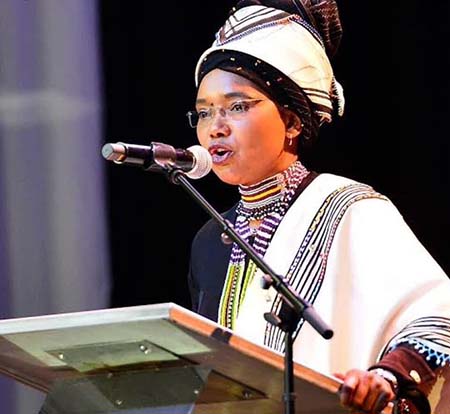It was a convergence of media practitioners, communication scholars, staff and students on the Mahikeng Campus of the North-West University (NWU) as the legengary broadcaster and famous isiXhosa language news anchor, Dr Noxolo Grootboom, delivered a public lecture on indigenous language broadcasting.
This public lecture was hosted in hybrid format by the NWU’s Indigenous Language Media in Africa (ILMA) research entity.
In his welcome address, director of the entity, Prof Abiodun Salawu, said this event aimed to spread the reach of indigenous language media beyond the shores of Africa, with a call on stakeholders to support the research entity in its philosophy of continuously promoting indigenous languages, and African culture and tradition.
Media guru Dr Grootboom, who moved from grass to grace from typist to celebrated broadcaster, blamed policy makers in the broadcast industry for the pace at which indigenous languages are dying on the African continent.
She argued that forgetting one’s language is tantamount to forgetting one’s heritage. “Indigenous language tells you more about who you are; your language connects you to your soil and to your ancestors,”said Dr Grootboom.
According to Dr Grootboom, her career was shaped during the apartheid era in South Africa, which was also the most challenging period in her career as a journalist. “Thankfully democracy bridged the gap of discrimination, and this period ushered in a high level of professionalism from black people, with brilliant individuals introducing indigenous languages into the system,” she added.
She said making room for indigenous languages in news bulletin and programmes is still a critical issue at the South African Broadcasting Corporation and other broadcast media.
“Casting and presenting news in my mother tongue for decades is something I never took for granted. My broadcasting philosophy was to make other people love my language, isiXhosa, and to ensure it is a language to behold.
“News and content producers should therefore use all the resources available – no matter how few – to fight for the survival of indigenous languages for the sake of future generations,” Dr Grootboom added.
She commended the ILMA research entity for dedicating so much resources to the promotion of indigenous languages.
In his closing remarks, Prof Mpho Chaka, deputy dean for teaching and learning in the Faculty of Humanities, noted that the lecture came at the right time. “The primary duty of the faculty is to make a meaningful contribution to the student curriculum, part of which is the promotion and preservation of indigenous languages in Africa.”
More about the legendary broadcaster
Dr Grootboom boasts more than 30 years’ experience in broadcasting. The legendary anchor inspired the nation through her stellar news reading skills and iconic sign-off – “Ndinithanda nonk’ emakhaya” – that enlivened many homes every night. Her sense of humour glued many indigenous language lovers to their television sets, and her dexterity even won over non-isiXhosa speakers too.
Even President Cyril Ramaphosa honoured Dr Grootboom by delaying his scheduled address earlier in 2021 not to coincide with her last news bulletin, which marked the end of a 37-year career in broadcast television.
“This national honour was one of the most memorable days in my life, and will linger in my memory for a long time,” said Dr Grootboom.

Dr Noxolo Grootboom.
